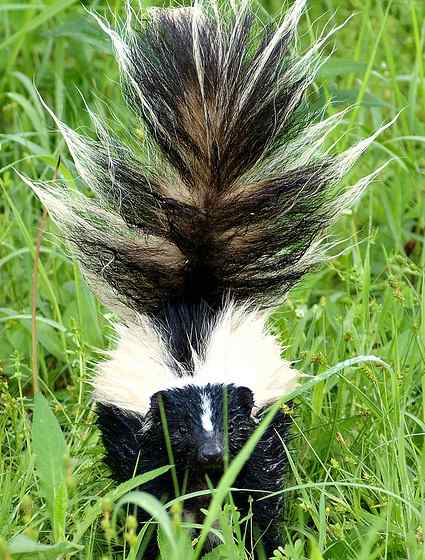
If you have lived in the Portland area for any length of time, you may not have seen a skunk, but you almost certainly have smelled one. Their trademark odor is nearly unmistakable and can be smelled from vast distances away from the source of the odor.
Skunks are easily identified by their distinct white strips on black fur. They are roughly the size of a large cat and have long front claws that allow them to easily dig for food and shelter. Their bushy tail is also a dead give away, which is raised into the air before emitting their foul smelling odor.
Skunks can survive on a wide variety of foods. Their diet includes insects, earthworms, pet food, and small rodents. They even are a major predator to honey bees since their thick fur allows them to not get stung while they eat the honey bee nest.
Spring time is when skunks begin to mate, with the young born around May. A female skunk will have between 4 to 7 “kits” and will care for them until they are mating age (around 1 year old). Males do not participate in raising the young.
Although skunks posses a notorious defensive mechanism in the excretion of their anal glands, they are slow to actually use it. If threatened, a skunk will generally hiss and raise its tail to ward off predators before spraying. The chemical used in these anal gland excretions takes about 10 days to build up in their body, so they are reluctant to use it. Once they do use it, the odor is very strong and difficult to get off of clothing. Most predators steer clear of skunks, but overly curious dogs tend to be the worst offenders.
What you can do:
If you have skunks around your property, you will want to steer clear and call a professional right away. In addition to creating a horrible odor, skunks can actually be dangerous to your smaller pets. To protect your home, be sure that you are not drawing them to your property by leaving pet food or household garbage accessible, providing them with an easy food source. Also, check around your house and ensure that no foundation vent screens are open and inviting them in. Lastly, check around decks and patios to ensure that you do not have places where skunks can squeeze underneath for shelter.
What we can do:
As licensed professional wildlife control operators, we are familiar with skunk behaviors and habitats. By understanding these things, we are able to humanely trap them without damage to you or your property. It takes great skill and custom made traps to capture a skunk without getting sprayed, leaving a horrible odor around your home.
If you have problems with skunks or any other nuisance wildlife, we would be happy to help you get rid of them. Please give us a call to set an inspection. We are available to help you or even give you some free advice!
Photo credit: vladeb / Foter / Creative Commons Attribution-NoDerivs 2.0 Generic (CC BY-ND 2.0)


